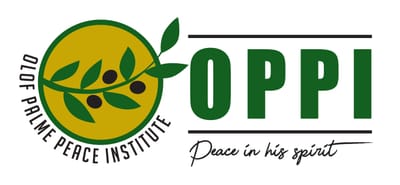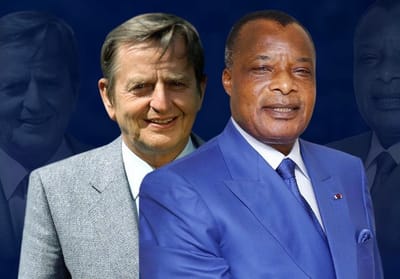Programmes


Two leaders from two different countries, one white and the other black, but bound by one conviction, that of peace. They have always believed that peace is not only the absence of violence or war, but also the presence of social solidarity for peace that is the foundation of all sustainable development.
Olof Palme and Denis Sassou N'Guesso are the only two world leaders in power at the time to go down in world history for their major speeches in the same year, 1986, in which they both publicly denounced apartheid and colonialism and reaffirmed their commitment to the struggle against the two most vicious and repressive systems in the history of mankind. Olof Palme gave his speech at the Swedish People's Parliament against Apartheid in Stockholm on 21 February 1986 (seven days before his assassination on 28 February 1986) and Denis Sassou N'Guesso at the Organisation of African Unity in Addis Ababa on 28 July 1986. The world in general and Southern Africa in particular owe these two leaders their due for their leadership and international solidarity in promoting peace in Southern Africa. Both leaders devoted their efforts to placing their countries and their political parties on the world stage to make the case that peace is the only ingredient for sustainable development.
Apartheid and colonialism were the common denominators that drove both leaders to work for peace and freedom for the people of Southern Africa in general, and black South Africans in particular. They understood that leadership is the process by which a leader influences individuals or groups to adopt attitudes and actions in pursuit of a common goal, and they committed themselves to doing so for the peace and well-being of humanity. The two leaders understood that their leadership was based on solidarity, because they believed that they were the keepers of their brothers and sisters in order to advance the cause of a better world for all.
Given the above, the following are OPPI's programmes:
1. The leadership and international solidarity of Olof Palme and Denis Sassou-N'Guesso for peace in Southern Africa
Olof Palme lived and breathed international solidarity, a societal attribute that helped him become an exceptional leader with a big heart for the world's downtrodden. He might have known the risks associated with his belief in peace and his firm stance against the world's oppressive regimes; nevertheless, he continued to ensure that nothing deterred him from serving the oppressed peoples of the world. He remained true to his ideal of solidarity with the world's downtrodden, an ideal he believed was relevant to bringing eternal peace to the world and for which he was prepared to die.
He waged a war without physical weapons against these evil regimes; his relevant ideals were his real weapons in this respect. It is important to mention that Olof Palme did not just take the side of the oppressed from a distance, but visited some of the following countries in Africa: Algeria, Gambia, Ghana, Guinea-Bissau, Mozambique, Nigeria, Senegal and Zambia. He did this with the intention
to witness firsthand the plight of the poor people, but also to meet with the leaders of these countries in order to reflect on how best they can work together in developing strategies for the total liberation of Africa.
Although Olof Palme never celebrated the signing of the Brazzaville Protocol, as he had already been assassinated on 28 February 1986, the truth is that the Brazzaville Protocol, signed on 13 December 1988, is in fact the culmination of his many years of commitment in the struggle against apartheid and colonialism in Southern Africa. However, he died a martyr because he believed all his life in the peace and freedom of the people. The agents of doom killed his physical body but not his spirit. Be that as it may, his spirit lives on and his legacy of peace will forever be engraved in the process of building a better Southern Africa as long as people continue to believe in peace.
Although his involvement in the struggle against apartheid dates back to the early 1980s, Denis Sassou N'Guesso's leadership and international solidarity became more apparent and palpable during his tenure as Chairman of the Organisation of African Unity (OAU) from 1986 to 1987 when he:
- First, prioritised the struggle against apartheid and its abolition, influencing the OAU to launch the Africa Fund. This fund mobilised the financial and material resources needed to enable black South Africans and frontline states to overcome apartheid and colonialism.
- Secondly, organised an international symposium of writers against apartheid in Brazzaville on 25 May 1987, on the theme "Writers indict apartheid".
- Thirdly, developed a diplomatic and solidarity strategy which took him to capitals such as Paris, New Delhi, Beijing, Berlin, London, Washington D.C., Moscow, Oslo and Stockholm to seek support for the struggle against apartheid.
Denis Sassou N'Guesso also urged his government and the Congolese people from all walks of life to send their humble financial and material contributions to support black South Africans in their struggle against racial inequality and human abuse in South Africa. It is important to mention that Denis Sassou Nguesso is one of the architects of the Brazzaville Protocol. He demonstrated his skills through his multiple interventions during the negotiations when deadlock loomed on the horizon, when the negotiators were heading straight for the wall and when they were at an impasse. He always met with the group that had the most rigid position and always managed to propose a way out to relaunch the negotiations. He would explain to the negotiators what needed to be done, what path to take, what arguments to put forward, what historical facts to highlight, to get things moving again. He guided them on a daily basis. What a great leader of the 20th century!
The signing of the Brazzaville Protocol on 13 December 1988 by the Angolans, Cubans and South Africans in Brazzaville, the capital city of the Republic of Congo, paved the way for:
- The withdrawal of Cuban and South African troops from Angola;
- The implementation of UN Security Council Resolution 435 on Southern Africa, which led to Namibia's independence;
- The end of apartheid;
- The birth of a new South Africa;
- The release of Nelson Mandela.
OPPI will continue to regard the Brazzaville Protocol as an essential tool from which African countries can learn in their quest for long-lasting peace.
2. The Brazzaville Protocol Annual Lecture
The Brazzaville Protocol Annual Lecture aims to educate the people of Africa on the objectives of the Brazzaville Protocol, particularly young people in schools and universities. We believe that this process will enable young people to deepen their understanding of this continental and historical reference work, which is regarded as of great importance in the process of developing a culture of reconciliation and peace throughout the African continent.
The Brazzaville Protocol Annual Lecture will serve as an academic and social platform for preserving the historical richness of the Brazzaville Protocol for the integral development of Mother Africa.


